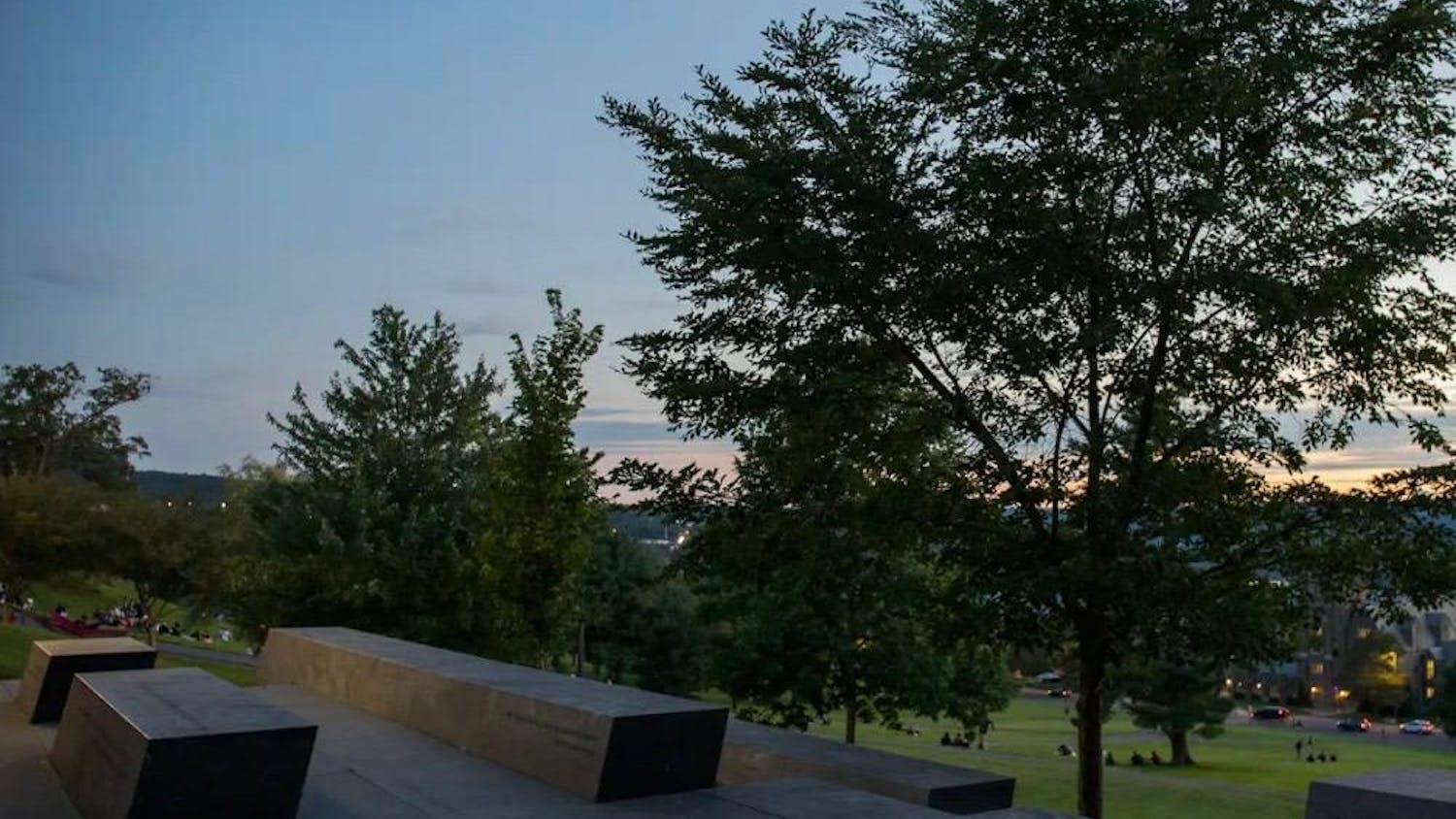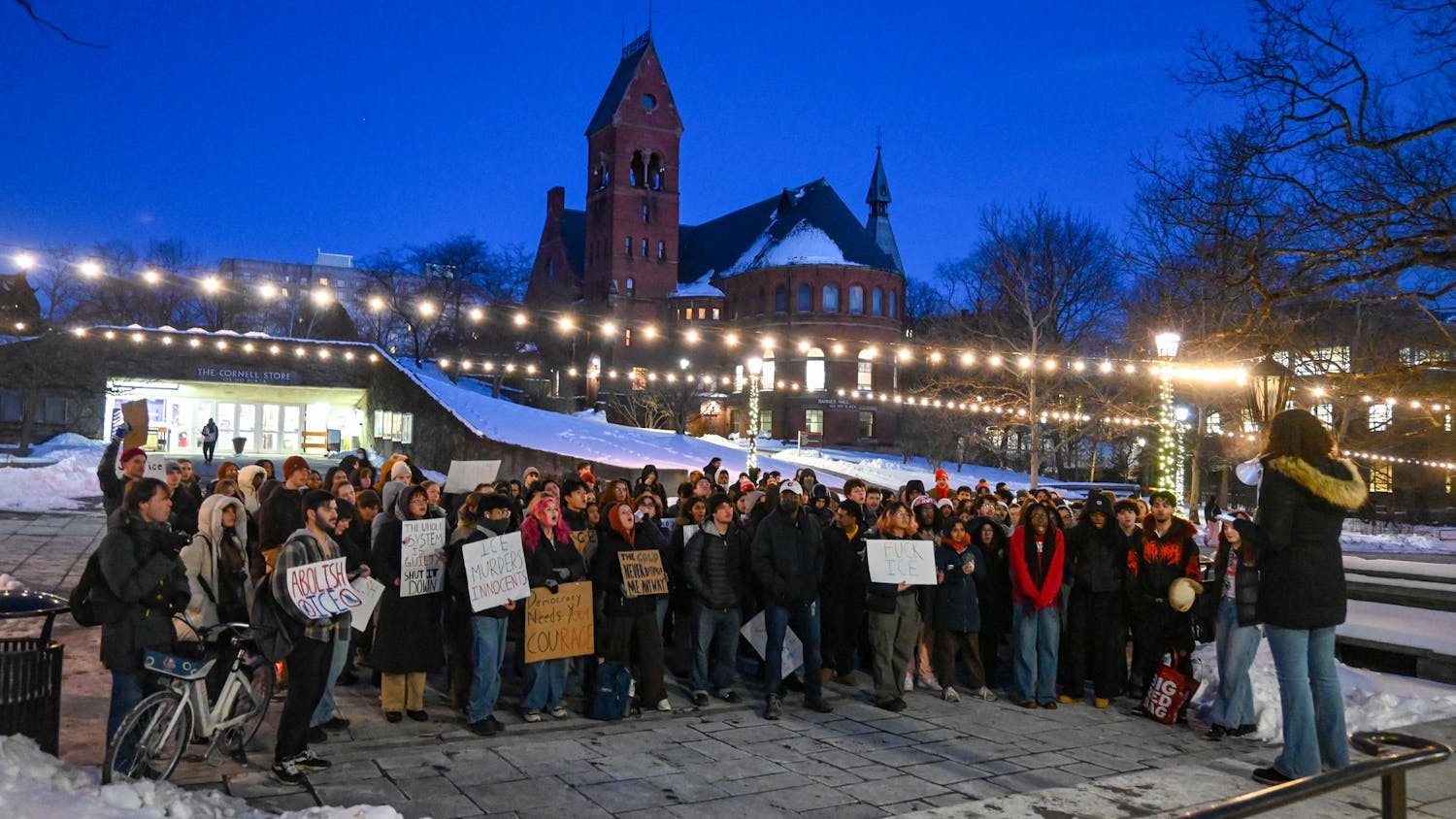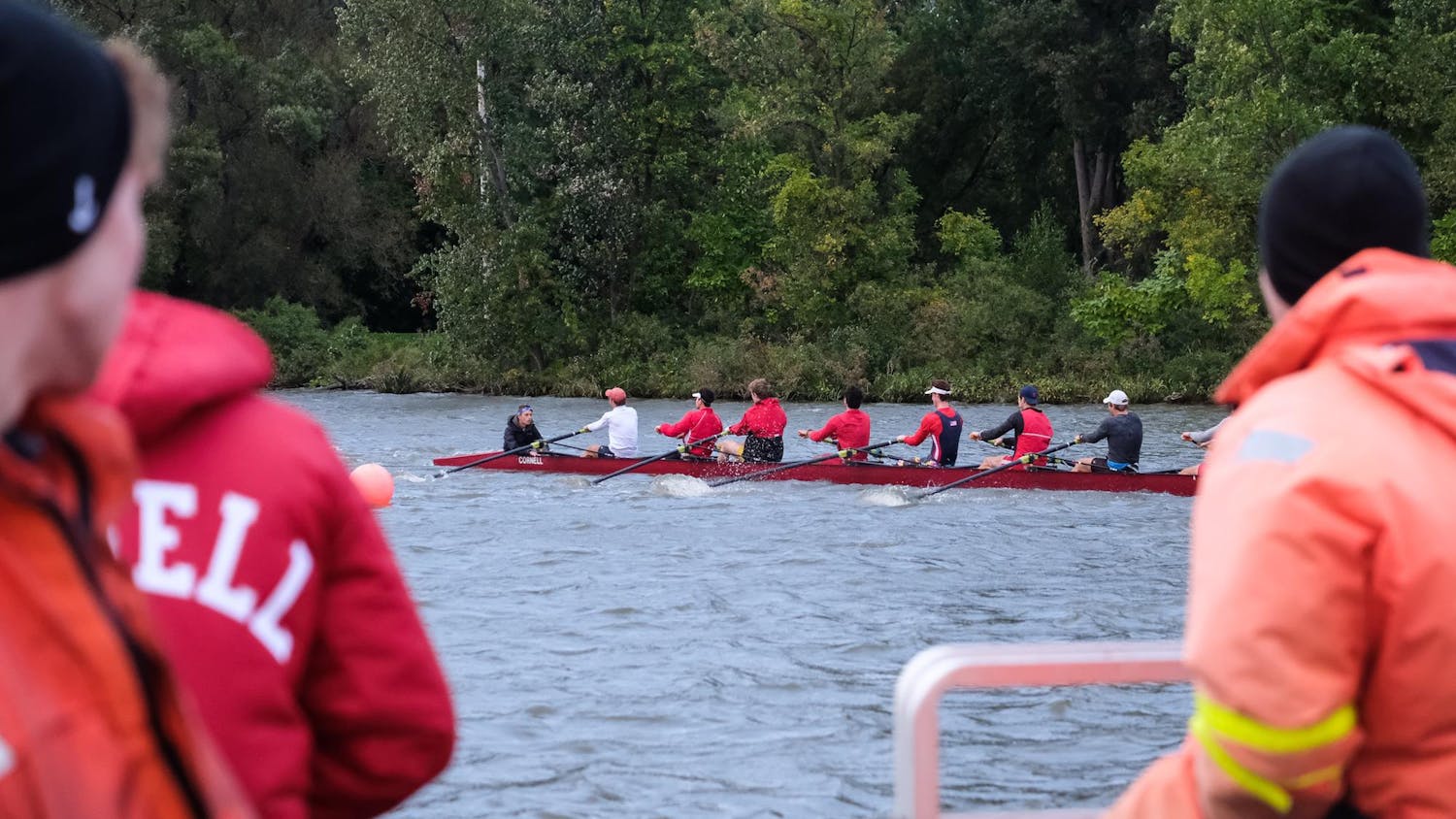Students and faculty will see a change in surveillance around campus with Cornell’s recently updated Policy 8.1, 1.8.5. This policy, which increases administrative control over centralized security systems, has sparked backlash from students and faculty who are concerned with its potential to infringe on freedom of expression.
A key part of this update incorporates all cameras, including academic and research, into its centralized surveillance system — with certain exceptions. This is a significant change from previous policy, which allowed faculty to make unrestricted use of standalone surveillance systems. This policy was updated Jan. 28, one week after pro-Palestinian activists vandalized the Andrew Dickson White statue on the Arts Quad.
The new policy requires cameras to be incorporated into all construction zones on campus. Cameras from the McGraw Hall renovations can be seen over the Arts Quad, the site of many student-led protests during the 2023-2024 academic year.
At a meeting with Cornell Hillel parents held in October, Vice President of Student and Campus Life Ryan Lombardi explained the University’s new strategy for identifying pro-Palestinian protesters who engaged in vandalism.
“We have implemented a new approach as we renovate buildings, as we build new buildings, to make sure that we are installing cameras,” Lombardi said.
The policy contains "substantial revisions,” according to its revision notes, including adding the statement that “All cameras (including academic and research) must be integrated into the university’s centralized security video surveillance system (unless an exemption is granted).”
New construction and renovation projects follow a tiered system of classifying potential surveillance areas, labeling options as “must incorporate,” “strongly recommended” or “recommended.” Cameras at entrances and exits are explicitly required to capture people’s faces.
Since the policy was released by the Division of Public Safety, multiple faculty members and student groups have expressed concern regarding the policy’s content.
An Instagram post from the Coalition for Mutual Liberation criticized the possibility of increased surveillance, claiming “Cornell is always watching” and writing “Cornell 1984.” The dystopian novel 1984 by George Orwell is set in a totalitarian state that uses surveillance to police free speech.
New Standards of Installation
In February, the Cornell Administration received a grant from the State of New York to fund the $385,000 “purchase and installation of security cameras for the campus.”
The policy defines a Network Video Surveillance System as “any video installation with the capacity to view or record university owned or controlled spaces,” except for personal web cameras and audio or visual streaming devices used for “official university instruction or business needs.”
When asked for clarification about cameras being added into classrooms, Associate Vice President of Public Safety David Honan wrote in an email to The Sun, “Classrooms are not fitted with cameras,” with the exception of research laboratories with regulatory requirements, where faculty asked for cameras disconnected from the central security system for documentation purposes and studios with cameras installed for “life safety purposes.”
Honan also explained that video is not actively monitored, but instead stored for up to 14 days if an incident occurs. Audio is also not recorded by the cameras.
In response to questions about the standards for determining camera placement and exemption policies for faculty, the University referred The Sun back to Policy 8.1. Currently, the chief of police and director of risk management are tasked with determining eligibility for exemptions.
Faculty Concerns
At a Faculty Senate meeting on March 14, multiple faculty members raised questions about potential privacy issues with the policy and its impact on freedom of speech. At this meeting, Honan spoke on the aims of University security systems.
“The use of physical security systems is important in maintaining adequate controls and ensuring the safety of the University,” Honan said at the meeting. “These measures are designed to support the safe and continuous operation of the University, ensuring an open, safe, and welcoming campus while minimizing risks.”
Research Associate William Katt stated concerns of misuse by the administration in an interview with The Sun.
“You could also imagine someone who had a grudge against a student and perhaps just trying to, you know, dox them or their schedule, I'm sure there are endless ways that recordings could be misused.” Katt also expressed a desire for a transparent audit to be held to ensure responsible use by operators.
The policy requires individuals to be authorized through the Division of Public Safety Access Control Program to view surveillance footage, and states footage “is not intended to be used as a tool for routine performance management of university employees.”
Prof. Noah Tamarkin, anthropology studies, took issue with what he saw as a lack of faculty and collective input that went into making the policy in an interview with The Sun.
“There's a trusting of structures of authority built into the policy that imagines that abuse of power cannot and will not happen,” Tamarkin said.
An archived version of the policy from 2022 details the creation of installation committees, consisting of representatives from different departments meeting with the chief of police with the goal to “improve security on campus with the community members’ interests in privacy, assembly, and free speech.”
The new policy has no such mention of a committee. Instead, the Division of Public Safety Access Control team is responsible for evaluating installations, which then must be approved by the chief of police, the director of risk management or their designees.
Policy Implications
Another addition to the policy stated that cameras installed for new construction and renovation projects are required at any area identified by the chief of police, director of risk management or a unit as “high institutional or academic risk and/or high asset value.” These outdoor construction locations currently overlook common areas of protest activity.
In a statement to The Sun, Thej Khanna ’26 and Mira DeGregory ’26, co-presidents of Cornell American Civil Liberties Union, expressed concerns with the cameras’ implications on international students, particularly those engaging in expressive activity on campus.
Khanna noted the part of the policy which states that recorded data can be used in the “event of suspected criminal activity, or any other incident which could create a liability for the university.” According to the policy, the recorded data also “must be made available and may be seized as evidence or supporting institutional documentation and held until the conclusion of any judicial/legal/administrative proceeding or analysis.”
“I think the implications for immigration are massive with this sort of surveillance, and you can see how, like, similar forms of surveillance are being employed in other spaces, such as borders like [with the Transportation Security Administration],” Khanna said. “The potential for this to balloon outside of just this University and just students on campus, but also specifically undocumented students or international students who are at risk of losing their visa because of the current administration policies, I think, is massive.”
DeGregory elaborated on this concern, saying the policy might make international students “scared.”
“[The policy] may make them exclude themselves from certain spaces on campus to avoid being captured by these surveillance cameras,” DeGregory said. “Because, you know, any kind of active participation and speaking out could expose … their status to some kind of risk.”
The Trump administration led a widespread student visa revocation and termination effort across college campuses, changing the status of over 1,800 international students and recent graduates. However, in mid-April, the administration reversed course, restoring Student and Exchange Visitor Information System statuses, including for all impacted Cornell students.
International graduate student and campus activist Momodou Taal self-deported after being requested to turn himself in to Immigration and Customs Enforcement amid his lawsuit against the Trump administration over alleged First and Fifth Amendment rights violations.
Prof. Richard Bensel, government, contextualized the surveillance policy as a part of what he saw as a larger Cornell administration attempt to appease the federal government.
Bensel also labeled the cancellation of Kehlani as the Slope Day headliner as “a way of aligning” with the federal government. Cornell is facing reported cuts by the Trump administration, totaling over $1 billion, with approximately $250 million currently accounted for by stop-work orders.
When announcing the cancellation, Kotlikoff wrote that the performer had “espoused antisemitic, anti-Israel sentiments in performances, videos, and on social media.” He later told The Sun that national media attention did not help the situation when “trying to convince the federal government and applicants and our community that this is a safe place for everyone,” but emphasized that “the fundamental issue” for him “was the views of the students.”
“The audience for those policies is, in fact, the … president's administration in Washington,” Bensel said. “And I suspect the central administration of Cornell doesn't really relish the idea of aligning itself with the Trump administration, but in fact, that is what it is doing.”
Clarification, May 15, 5 p.m.: The Policy Implications section of this article has been updated to establish a more contextualized account of sources’ perspectives on surveillance.
Correction, May 12, 7:30 a.m.: A previous version of this article incorrectly summarized the policy as not allowing faculty to make use of personal cameras. The article has been corrected to reflect that the policy allows for certain exemptions.

Everett Chambala is a member of the Class of 2027 in the School of Industrial and Labor Relations. He is a staff writer for the News department and can be reached at echambala@cornellsun.com.











